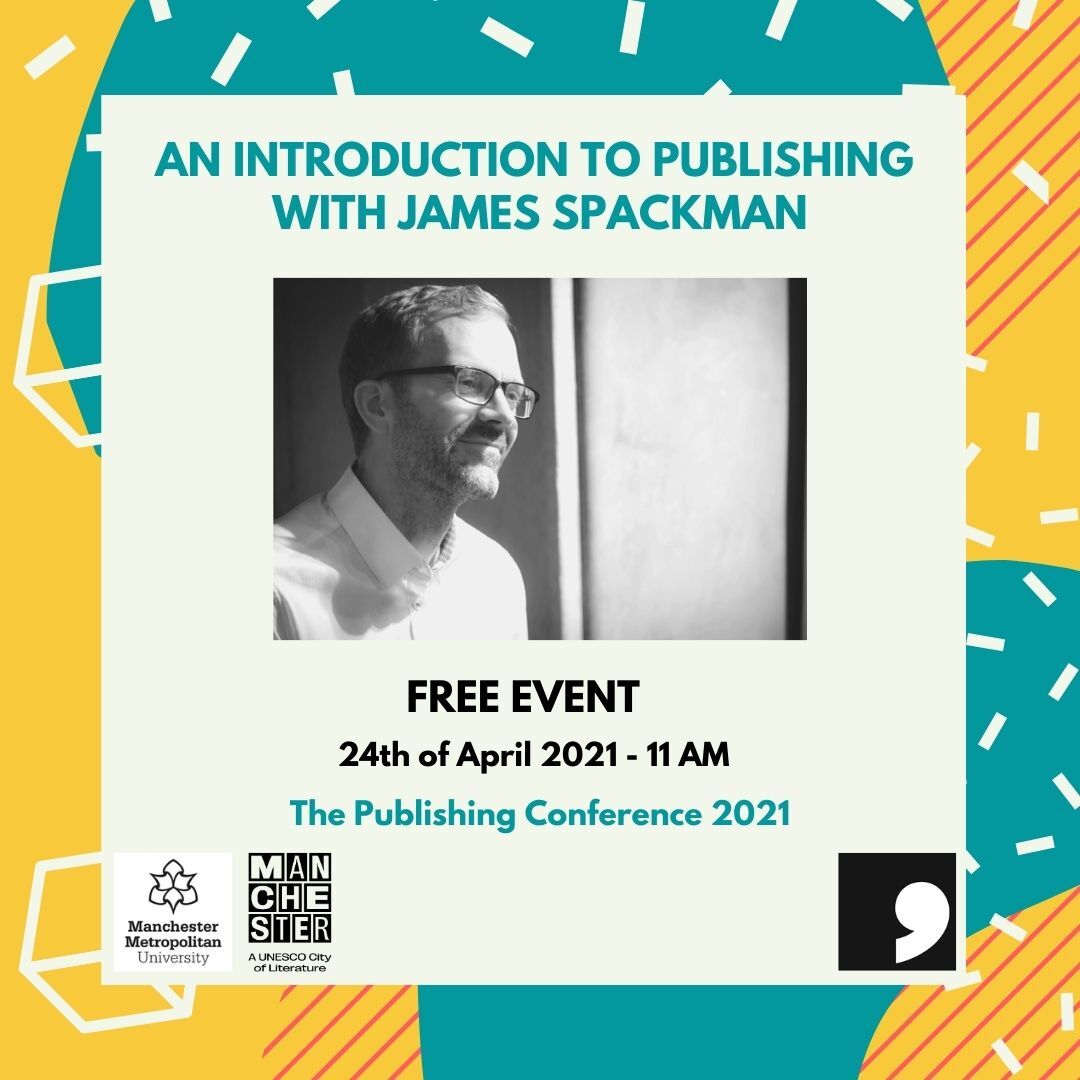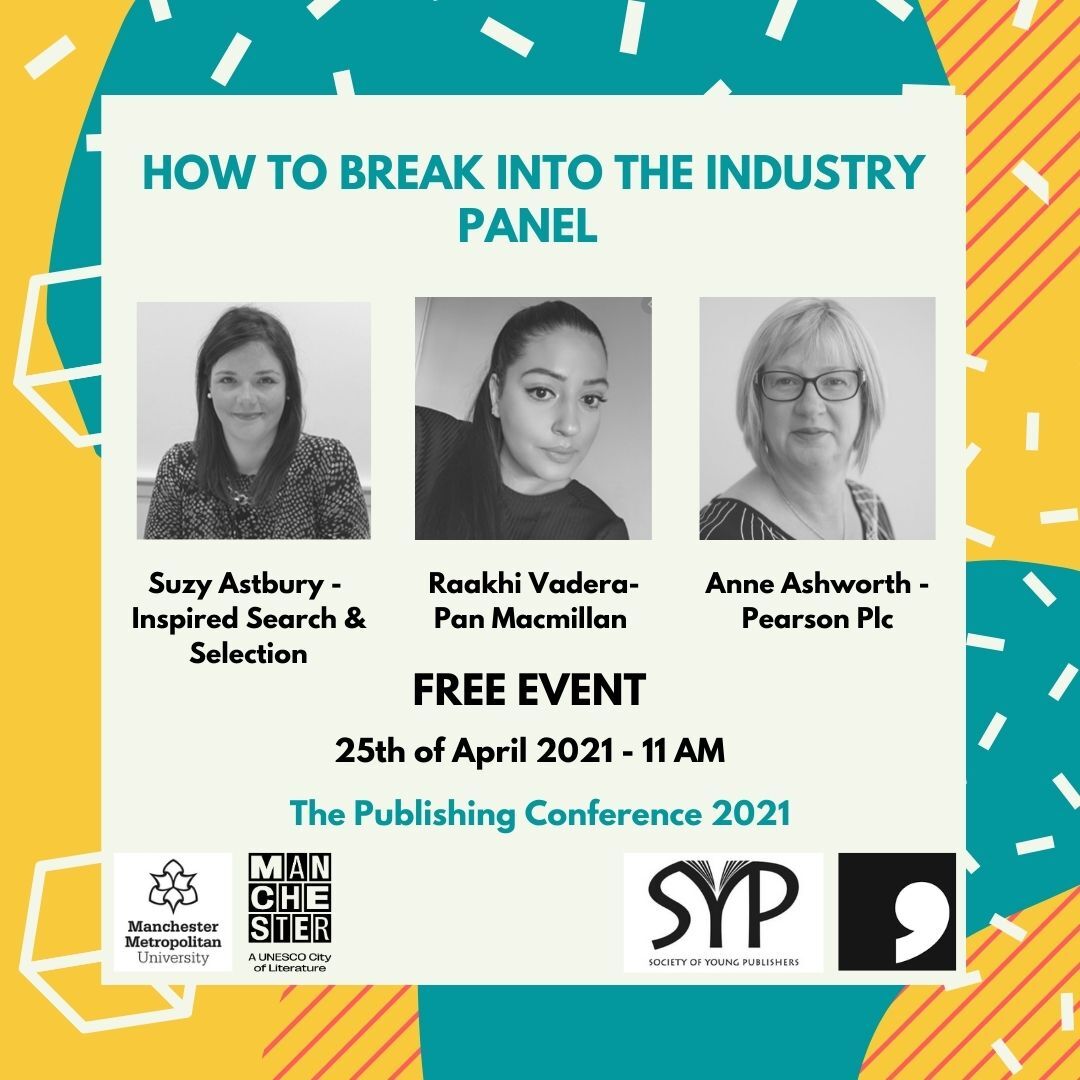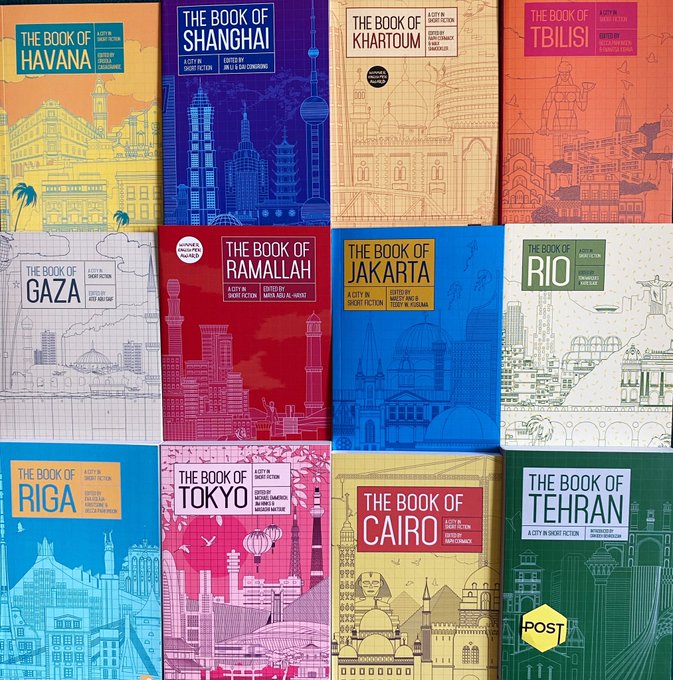Industry insight: Comma Press talk publishing
By Maisie Scott

Comma Press is a Manchester-based indie publishing house. The small press focuses on publishing translated work, interdisciplinary collections and short stories. However, throughout the year Comma Press also hosts industry conferences which are open to the public. Check out ‘The Publishing Conference’ on the 24th and 25th of April and the free online events on YouTube.
In October we spoke to Zoe who works as an in-house publicist during our ‘conversation with Comma Press’. Once again we’re going into conversation with Comma Press to discuss how students and graduates can make moves into the publishing industry. We spoke to Zoe who works as a publicist and editorial assistant, and Becca who is the engagement manager at Comma to find out more about the small press.
Career backgrounds
So, talk us through your current job role and position within Comma Press?
Zoe: Our roles are really varied and they all cross over in some way because there are only five of us. I am the publicist at Comma, but I have recently been retitled as the ‘Publicist and Editorial Assistant’ because I was taking on more editorial work. So, I run the press campaigns for each book and I also lead on some editorial titles. Currently I am working on three editorial projects. I also organise our outreach conferences. My work crosses over with Becca’s because I do some marketing and events work outside of my remit. I work with Becca with the internship programme.
Becca: My job title is ‘Engagement Manager’ which is a catch-all-term for various things. Primarily I focus on events and marketing excluding the conferences which Zoe organises. There’s also a lot of social media work with the role. We all do a bit of editorial and production work within our positions. My role covers sales and getting our books into the bookshops and liaising with our distributor, printers and sales team. The work is broad and fun because we can personalise our roles.
What’s your career background, and did you always know you wanted to pursue a career in the publishing industry?
Zoe: I wasn’t seeking out a publishing role. I did my English degree at MMU and I loved that. Afterwards I did an MA in film production because I was interested in finding out how films are made. I did that for a year. But, I had experienced placements in the film industry and at random galleries. Additionally, I had run my own literary projects and taken part in a lot of event work as well. I was kind of just looking for a job that encapsulated all of that experience and that is what the role at Comma ended up being when I went for it. It was amazing timing when the job at Comma was advertised.
Becca: I decided I wanted to get into publishing when I was an undergraduate at Lancaster University. So, I studied English literature and I volunteered to edit a couple of magazines. Additionally, I organised spoken word and poetry nights on campus. I volunteered at the Literature Festival. So, publishing seemed like the most natural progression from my interest in literature. I was lucky at Lancaster that they had a great internship scheme. One week after graduation I went and did a publishing internship at Carnegie in Lancaster. I got a second internship at Comma which was meant to be 3-4 weeks, and at the end of the internship I got offered a temporary contract until Christmas.
I actually had an offer to do a publishing MA at UCLan but I put it on hold for a year. So, I thought I would do a few months at Comma and then afterwards go do the publishing MA. Then at Christmas I got offered a permanent contract at Comma and now almost 5 years later I am still here. I’ve got the kind of intern to management wonder story. To be honest I never would have dreamed of this as an undergraduate. I had visions of doing the publishing MA and then working my arse off in London. Probably sleeping on people’s sofas then maybe coming back to the North if I found work opportunities. I’ve been very blessed that I now live in Manchester and work at Comma.
What work do you carry out on a day-to-day basis?
Zoe: My day-to-day work involves building press lists for titles, pitching titles to literary editors and journalists, scheduling posts for social media and collating publicity. In terms of editorial work I do a lot of copy-editing and proof-reading. Conference and events wise I schedule speakers and organise programmes. I set up and run the events and make sure everyone has the information beforehand.
Becca: There is a lot of admin. I think people don’t realise that even with publishing there is just a lot of admin. So, as well as talking to people we’re partnering with for events I’m often updating metadata to make our books look nice on the Waterstones website. Alongside this I also update our sales material, catalogues and advance information we send out. I also spend time proof-reading and scheduling social media posts. I split the social media work with Zoe because we have a lot of platforms. Every other Friday I do the newsletter. The work is different every day even though there are tasks that reoccur. The joy of working in publishing is that you are doing different work on a daily, weekly, monthly, yearly basis. We publish 10-12 books each year so each month we’re working on a new book.
What has been the proudest moment in your career so far?
Becca: I worked on a project a couple of years ago called 28 for 28 (#28for28). It was part of our Refugee Tales series which is aiming to put an end to the indefinite detention of refugees and asylum seekers which remains an important and ongoing issue. We put together a big video campaign where we got authors and actors to read stories from the books we published, to camera. Prior to the opening of Parliament that year we released a video a day from the series. The project was incredible because I got to be there for the filming of some of the stories. Some of the actors we worked with included Jeremy Irons, Maxine Peake, and Zoe Wanamaker.
Also, one of the videos was shown in a parliamentary committee. I think the video contributed in a very small way to a white paper which was completed by the government. But, it’s all gone backwards now due to certain members of the Conservative government. 28 for 28 highlights the plight of refugees and asylum seekers in the UK and exposes the injustices in the current system. So, it feels incredible to be part of something that important. I know Zoe is working on the new addition to that series at the moment. It’s something that we have published since 2016 and it’s always an incredible honour to work on this project.
Zoe: I completely agree with Becca and working on this new book is probably one of my highlights. But I would also say the first editorial project I took on stands out for me. I co-edited a book on Newcastle with Angela Redman which is really amazing. Also, I love running the writing conference and especially when it was in person. In particular, the first year when I took it on and got to rework the programme and see everyone on the day networking and pitching to agents. There were so many people in the space chatting and learning from each other. I loved that.
5 tips for people pursuing publishing experience
- Do your research when you’re applying for jobs. This applies to most jobs but especially in publishing. I can always tell when someone has written a cover letter and they haven’t been on our website or social media and checked what we’re up about. Check the social media of the company.
- Don’t copy and paste a cover letter for different publishers. All the publishing houses are very different so you can’t send the same cover letter to Penguin and to Comma because it will be obvious.
- Check out the Society of Young Publishers and the events they run. The society has branches across the UK and they run fantastic events. It is quite cheap to be a member and you get a lot from being one.
- Rearrange your CV and skip ordering it chronologically. Applicants tend to order their achievements chronologically, but it is good to rearrange your CV so your most relevant experience is at the top. So, if you carried out work which is really relevant to publishing pop it near the top rather than the bottom. I think internships and similar work should go at the top even if they’re not paid opportunities.
- Get involved in your local or online literary community. I know it’s hard around other work but anything you can do that will make you stand out is worth your time. If you can pick up voluntary editorial work for example. Or, get your own writing out there or set up an event. If you can’t find any events or group that suit you then it could be a great opportunity to do a DIY job and make your own event.
New directions in the UK publishing industry
Talk us through the free events setup by Comma Press for ‘The Publishing Conference’ on the 24th and 25th of April. How can students get involved?
Zoe: The ticketed sessions were limited because we could only have so many people on the Zoom calls, and we wanted them to be intimate events. But, this year the free events aren’t capped. So, they’re both going to run at 11am on the 24th and 25th of April. The first event is ‘An Introduction to Publishing’ with James Spackman. James is an incredible agent and publisher who kind of knows the business like the back of his hand and he’s going to do a big powerpoint on everything. The talk will be a whistle stop tour of everything the departmental events will be covering. So, it’s great for anyone that didn’t get a ticket.

The second free event is with a variety of publishing recruitment professionals and publishers. It’s a panel event and the focus is on ‘How to break into the industry’. There is representation from Pearson PLC and they will chat about their apprenticeship schemes with publishers. Joining them will be a panelist from Aspired Selection who helps people get jobs in the industry. Raakhi Vadera who is in HR at Pan Macmillan will also be joining the panel and she’ll share insight into the recruitment process and what she’s looking out for. The panel is chaired by SYP North.

People can sign up for the events via Eventbrite but they don’t actually have to because they’re on YouTube. We will be sharing the links for the YouTube events in the following weeks. There is also an opportunity to ask questions at the end of the talks.
The UK publishing houses are tightly locked into London. However, independent presses including Comma Press are doing vital work to devolve the industry and champion Manchester and cities outside of London. What advice would you give for students interested in pursuing a career in a small press?
Becca: Indie presses are often small teams with very small budgets. So, we have internships that we host but we’ve limited the number of unpaid internships. We offer a number of internships through universities we partner with including Lancaster, Sheffield Hallam, UCLan and MMU. We have also recently partnered with Creative Access to create a paid internship for someone from a BAME background. The candidate is going to start with us next month.
I think there are increasingly more ways for people to be involved with small presses and internships. The publishing industry is less London-centric now than when I first started with big publishers now setting up offices in Manchester and similar cities. In particular, these opportunities are available to students and graduates. But, I know this is a bit exclusive because not everyone goes to uni. I would say it mainly reflects the fact that universities have this funding which allows us to pay students to work with us.
You can also volunteer at Literature Festivals which is a really great way to get involved without committing to working. Weekend Literature Festivals give you the opportunity to meet loads of people and network with them.
Zoe: I guess if you’re specifically looking to get into the Northern indie scene then it’s nice to turn up to the events and make yourself known in some way. You can do this online. I would say it’s good to talk to people so you’re known, and when rare opportunities do arise the people will know your face and work.
Becca: We know some people who have had success setting themselves up on a freelance basis and then working with indie presses. You can make yourself known and strike up connections with a few different small presses and eventually go in-house if you want to.
Comma Press publishes a range of translated work, short stories and interdisciplinary collections. Out of all the work that’s been published so far this year by Comma Press what’s been your highlight?
Zoe: I really liked working on M. John Harrison’s Settling the World: Selected Stories. I hadn’t read a lot of science fiction like that before and especially not at work. Harrisons sci-fi is based in the human world and it focuses on our psyches. The stories are set in these amazing landscapes which he portrays. I guess it was a sort of love project because M. John Harrison is one of our prolonged authors and it involved putting his best short work together.
Becca: Just before Christmas we published The Book of Jakarta. I, like many people, probably hadn’t read Indonesian stories in translation before. It was amazing because it’s a really interesting anthology. Some of the stories are completely wild. There’s a story about a group of senior citizens who make a suicide pact and go to a theme park. There’s another about a driverless taxi driving into a flood. It was also the first time one of our city books has been reverse translated and published in the country of origin. So, a publisher in Jakarta has published the book in Indonesian. I think seeing the two editions side-by-side last week was incredible and really fun to see the book in situ in Jakarta with Jakarta in the background.

‘Northern writing’ and ‘regional writing’ have been used as tags by publishers to promote work. Eliza Clark’s debut novel Boy Parts has been celebrated as a piece of ‘regional writing’ because it is set in Newcastle and due to Clark’s background. However, in interviews Clarke has resisted these tags that have been placed on her work. What do you make of these terms and their use-value within the industry?
Zoe: There’s a crux because it’s beneficial from a marketing point-of-view and from a publicity angle. It’s so awkward because you have to box work into categories, especially when it’s on the margins, so that it is marketable to the mainstream. But, this means stripping the work of what it really and truly is about. I think that’s what Eliza is pointing out because this process immediately others people. It’s similar to when we market anything published by a woman as women’s writing. It makes you wonder why we still have to make those associations but we do and it’s the same for the North and South divide. We still have to shout that this is Northern literature because the North is othered.
Becca: Also, you have to tick a box when you’re doing the metadata of a title with the genre so bookshops know how to categorise it on their websites which reinforces these labels. There is not a lot of subtlety in the industry which is tricky. And it does suck sometimes that we do have to label everything. I think with the regionality aspect it’s similar to publishing because we as a press are proud to be based in the North. But, we have to remind people that because we’re based in Manchester it doesn’t mean we only publish Northern voices. We are a press that publishes Northern and British voices but we also publish voices from across the world and we have an international outlook.
There is the crux between being proud and shouting about your Northern and/or working-class roots, and the desire to not be boxed in and only known for those identity markers. It is important to spotlight Northern voices because they are under-represented due to the way the industry is set-up. I agree with Eliza and think that Boy Parts is an incredible book and should be celebrated for that. But, at the end of the day there’s always going to have to be categorisation because that’s the way the industry works.
Check out Comma Press’ social media sites to find out the latest about their publications and events. Also, make sure to pop a reminder on for the free events at the ‘The Publishing Conference’ on the 24th and 25th of April 2021.







